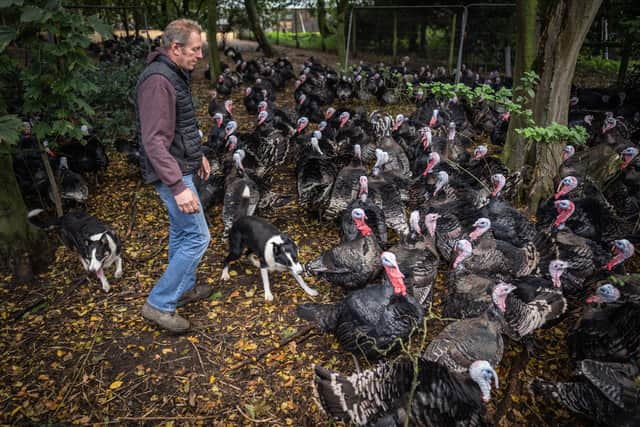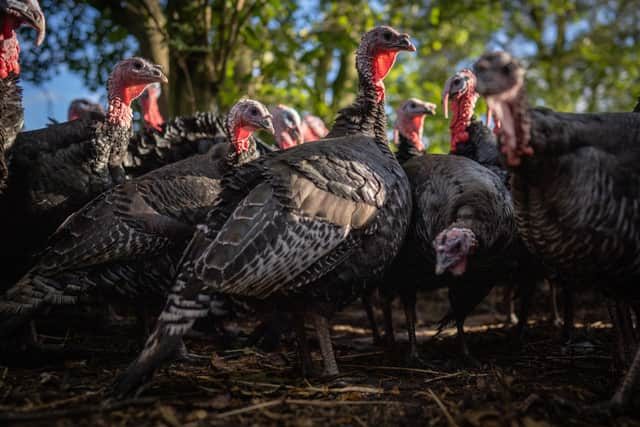Farmer warns of Christmas turkey shortage in UK as industry is ‘absolutely hammered’ by avian flu
and live on Freeview channel 276
A turkey farmer has warned that Brits might have to skip the classic bird on their Christmas dinner tables this year. Turkey farmer Steve Childerhouse says the industry has been “absolutely hammered” by the outbreak of avian flu.
The worst-ever outbreak of bird flu has caused many producers around the country to lose thousands of their birds. The UK produces around 11 million turkeys a year, but the virus has already claimed 3.5 million in 2022.
Advertisement
Hide AdAdvertisement
Hide AdChilderhouse said: “We are a traditional fresh farm, but even the big people are getting absolutely hammered by this. It’s affecting the whole industry. We supply a lot of butchers and farm shops, and we’ve told them we haven’t got any.
“They’re not selling any turkeys or geese this Christmas as they can’t get them. It’s going to have a massive impact on the Christmas market because they’re just not going to be there.”
The outbreak of the highly pathogenic H5N1 virus, or bird flu, might leave an impact even on next year’s Christmas dinner. In order to stop the virus, premises need to be empty for 12 months after an outbreak.
Childerhouse added: “As it stands with our farm, we won’t be able to produce any poultry on our farm for next Christmas either. Because we obviously got it at the end of October, we can’t touch our buildings for 12 months - and we get our birds in June and take them through to Christmas. The cleanup cost if you want to bring that forward is so expensive. We have to sit it out.”
Advertisement
Hide AdAdvertisement
Hide AdChilderhouse, who runs 35-acre Whews Farm in Norfolk, had to cull his 10,000-strong flock of turkeys earlier this autumn. The cull has forced him to look for a new job to support his family.
He said: “It was confirmed on October first that we had bird flu. It was pretty horrific. Obviously, we started by losing a few birds, and then it built up. Emotionally and mentally, it was very tough at that time. Moving forward, financially, it’s a massive hit for us - that’s what our business is.


“We built this business since I was 12 years old. We supply 80 to 90 butchers and farm shops. The impact on that is going to be quite tremendous. I’m going to have to go and find a job. We’ve got bills to pay. It’s devastating to be honest, as you can imagine. There is compensation, but it’s nowhere near what it should be.”
The outbreak of the avian flu has led Chief Veterinary Officers to introduce a nation Avian Influenza Zone, meaning poultry farmers must enforce strict biosecurity measures to safeguard their birds and prevent further spread of the virus.
Advertisement
Hide AdAdvertisement
Hide AdFarmers in Norfolk, Suffolk and parts of Essex also have a legal requirement to keep their birds indoors until further notice. The housing order will be introduced across all of England on Monday (November 7).


UK Chief Veterinary Officer Christine Middlemiss said: “We are now facing this year, the largest ever outbreak of bird flu and are seeing rapid escalation in the number of cases on commercial farms and in backyard birds across England. The risk of kept birds being exposed to disease has reached a point where it is now necessary for all birds to be housed until further notice.”
“Scrupulous biosecurity and separating flocks in all ways from wild birds remain the best form of defence. Whether you keep just a few birds or thousands, from Monday 7 November onwards you must keep your indoors. This decision has not been taken lightly, but is the best way to protect your birds from this highly infectious disease.”
